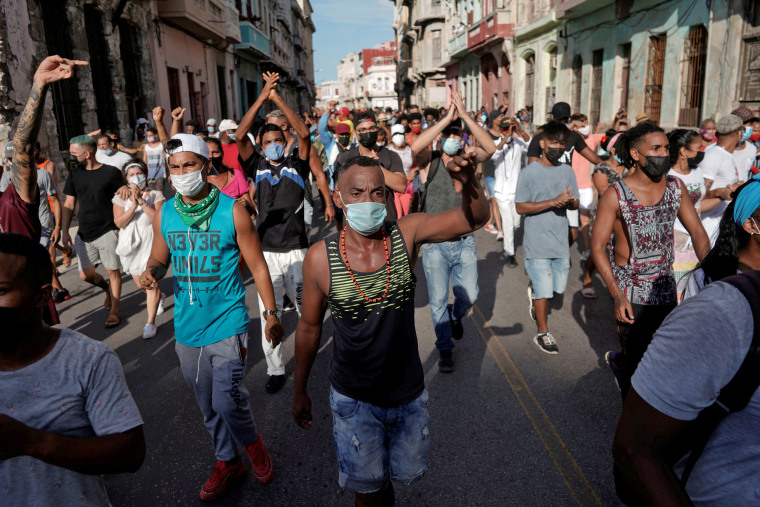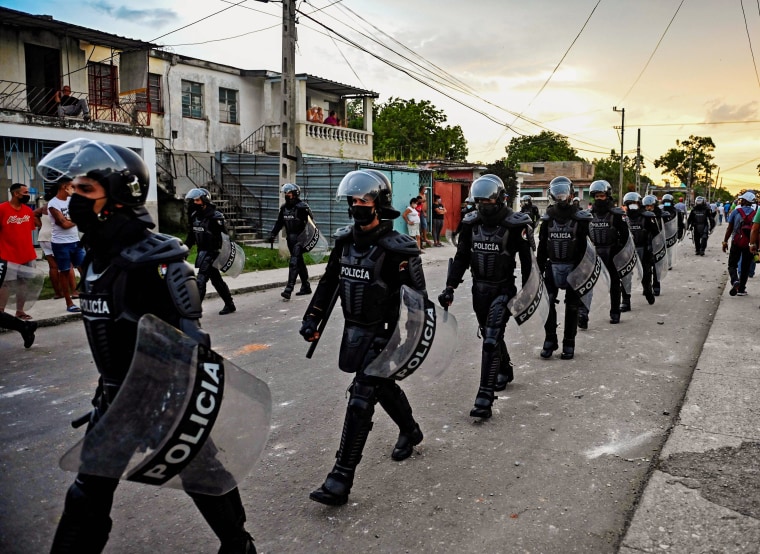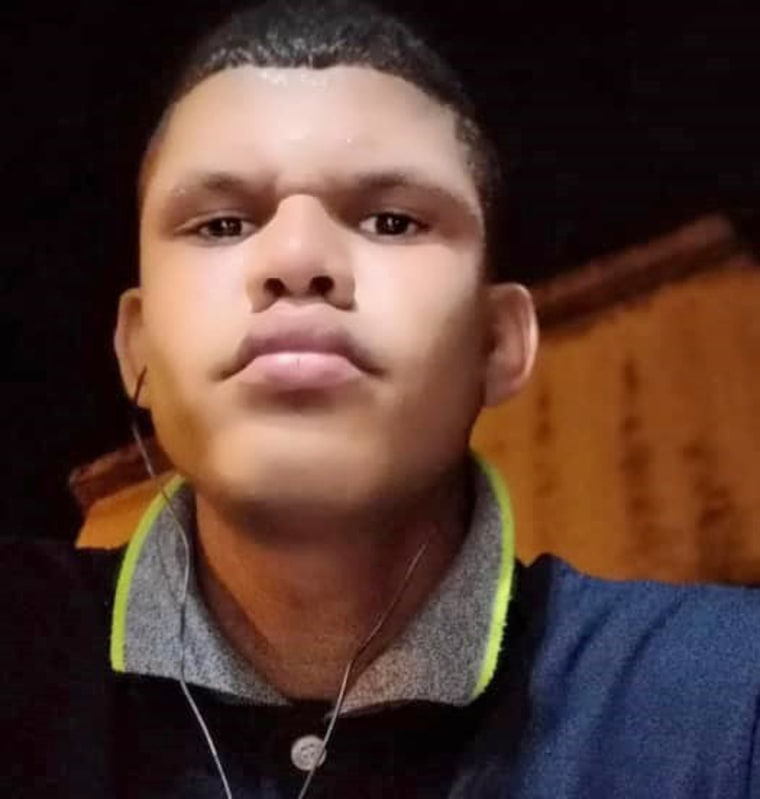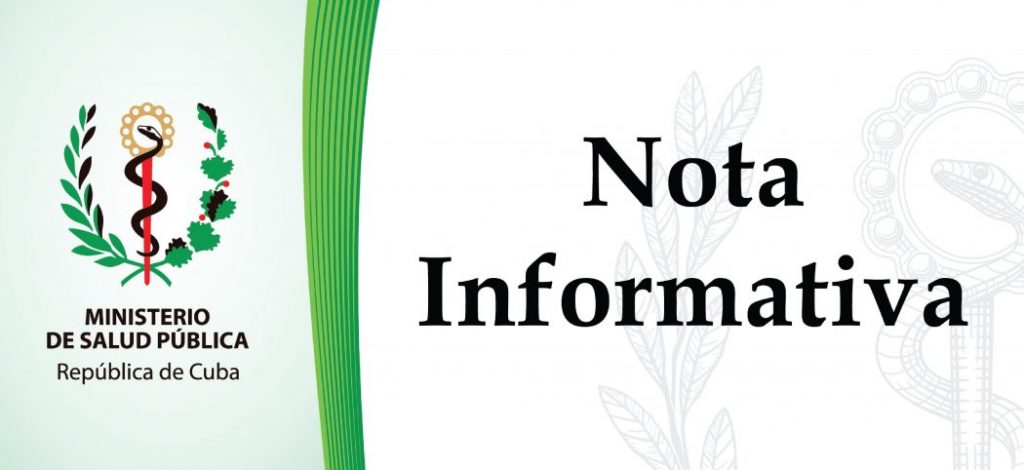'Drip drip' of harsh sentences for Cuba protesters deters engagement from U.S.
The long prison terms dump "a whole bucket of cold water over any push for improving relations," said Ric Herrero of the Cuba Study Group.
By
MIAMI — Brandon David Becerra Curbelo turned 18 in November in a Cuban prison.
The Havana resident was recently sentenced to 13 years for public disorder, sedition and other charges after he took part in unprecedented, historic protests that rocked the island in July. "He doesn’t even know why he is in prison," his mother, Yanaisy Curbelo, said by phone from Cuba. "He tells me: ‘Mamá, I don’t understand. I yelled ‘Patria y Vida’ and ‘Cuba is hungry,’ but I didn’t do anything else.’”
In the U.S., the trials have left many people with little appetite to push to open better relations with Cuba, long-standing advocates of engagement say.
“The Cuban government’s response to the July 11 protests and now these three months’ drip drip of exorbitant sentences against those protestors dumps a whole bucket of cold water over any push for improving relations in the United States,” said Ric Herrero, the executive director of the Cuba Study Group, a non-partisan organization that supports civil society in Cuba and engagement between the two countries.
Herrero said members of Congress have privately expressed to him that they are hesitant about traveling to the island or about calling for re-engagement because the “stream of sentences being handed down would undercut their efforts.”

The international community and rights groups have criticized the trials, saying they lack transparency and that the sentences are disproportionate to the crimes to deter any protests against the government. In Cuba, 30-year sentences are usually handed down for serious crimes, like murder.
Johana Tablada, the deputy director for U.S. affairs at the Cuban Foreign Affairs Ministry, said the U.S. government has “directed an incredible media display” to mischaracterize the protests and the sentences.
“There was only one day of protests where thousands participated, and now they are saying people are in jail for expressing how they feel. That is a lie,” Tablada said. She said no more than 300 people have been tried and sentenced and that they are tied to four violent acts: assault on a police station, assault on a pediatric hospital, assault on a pharmacy and assault on a commercial center where police vehicles were vandalized.
She said “it’s a lie” to say that peaceful protesters are in jail and that Cuba jails children.
“There is a specific interest by the United States government to use this as the new obstacle to justify its inhumane policy hardened by Biden’s administration,” Tablada said.
Cuban authorities announced in January that 790 people had been arrested and charged with crimes, but have given few details. Groups that keep track of detentions and trials, like Justice 11J, say they have confirmed 1,440 detentions, cautioning that the number could be higher because some people are afraid to come forward. They say 616 sentences have been issued, about 22 of them to people who were 16 or 17 when they were sentenced. Cuba’s Supreme Court said about 100 people who were convicted last month had “tried violently to subvert the constitutional order.”
President Donald Trump quickly ended President Barack Obama's historic opening with Cuba when he took office. Trump restricted travel and remittances and reduced the staff at the U.S. Embassy in Havana to skeletal proportions after mysterious health incidents were reported.
Joe Biden said during the 2020 campaign that Trump's actions were “failed policies” and vowed to reverse them, saying they “inflicted harm on Cubans and their families” and have “done nothing to advance democracy and human rights.”
Herrero said the Biden administration had been getting ready to act on changing some of Trump's policies when the protests erupted in July.

Now the general sentiment is that the hefty sentences make it difficult to make a case and win enough support for an opening.
Cuba's government accused the U.S. of funding and fomenting the protests, saying Miami-based opposition groups instigated July’s unrest through a social media campaign, with President Miguel Díaz-Canel comparing the trials in Cuba to the trials in the U.S. of those accused of storming the Capitol
Advocates in the U.S. say more engagement would put the U.S. in a better position to hold the Cuban government accountable for human rights violations and to address them directly with the government.
Herrero said, “All the U.S. government messaging to the Cuban government over these abuses is done via tweet.”
'He's just a kid'
For Kendry Miranda Cárdenas’ mother, life has turned upside down since her son was arrested days after the protests.
He turned 18 in prison in October and was recently sentenced to 19 years on charges of sedition and other counts. His family is devastated.

Former Rep. Joe García of Florida, a Democrat, condemned the protesters’ prison terms. He said U.S. policy toward Cuba is "a hard policy because it is laced with anger, resentment, victims, brutal persecution and tenacity."
García, who has traveled to Cuba to create more engagement between the two countries, said the lengthy prison sentences become "fodder for clever politicians on both sides of the straits" — referring to the U.S. and Cuba — to have entrenched positions and ultimately to "do nothing."
U.S. farmers who visited Cuba recently on a trade tour said at a news conference that they would like to sell more products to the island but that the decades-old embargo complicates their efforts.
Restrictions still in place
Trump banned U.S. companies from sending remittances via Cuban military-controlled companies, which included Western Union’s main partner. Cuban Americans still send remittances, but they use agencies that might charge more. The U.S. also suspended flights to all airports except Havana’s, making travel to faraway provinces difficult.
Miami resident Eloina Ramos, 77, hasn’t visited her 98-year-old mother in Ciego de Ávila since 2018. With flights restricted to Havana, she would have to travel seven hours by car from the main airport to get to her family — or go through a third country."They need to remove those restrictions, because they affect those who travel to other provinces," Ramos said.
Despite the impact of the restrictions, there haven’t been significant opposition or protests from Cuban Americans to change them.
Pressure to re-staff the U.S. Embassy is mounting as the number of Cuban migrants arriving at the U.S. has risen sharply — the number crossing the border at the end of March was up by 460 percent over the same time last year, according to internal Customs and Border Protection data obtained by NBC News. That outpaced the number of people arriving from Central America.
Fully re-staffing the embassy and restarting the Cuban Family Reunification Parole Program would help some Cubans arrive through less risky means. The U.S. recently announced that it would increase the staff at the embassy in Havana and begin a limited amount of some immigrant visa services, but most Cubans still have to travel to Guyana for visa processing. With ticket prices hovering around $3,000, the trips are inaccessible for many.
In the meantime, the trials in Cuba continue to generate attention as families hold out hope the sentences will be reduced.
Curbelo's son Brandon believes he’s not going to serve 13 years, she said, "because he didn't do anything else" except march in the street.
NBC News producer Orlando Matos contributed from Havana.
Follow NBC Latino on Facebook, Twitter and Instagram.

*******************************
Hi Carmen,
A good, comprehensive and balanced, article. My view:
1) Both Cuba and the US have responsibility for creating the conditions that led to the July 11-12 protests.
2) Like in Black Lives Matter and every peace demonstration I participated in some people violate the law by intention or losing self-control during the heat of confrontation.
3) In their own minds, and those of their allies, everyone arrested was innocent or at least justified and entitled to be proclaimed innocent.
4) The default position of authority everywhere is that an example must be set that discourages future violence and illegality.
5) Both Cuba and the US are responsible for an atmosphere of mutual distrust that leads to disproportionate sentences.
6) Hard liners in both countries profit from and are vindicated by harsh sentences and imprisoned examples/martyrs.
7) There is precedent for setting aside legal decisions with negotiated solutions: Bay of Pigs POWs, Black Spring convicted prisoners, Allan Gross and the remaining of the five heroes/spies
8) Bilateral agreement is the only way to achieve release of 11-12 J prisoners in a reasonable time. Otherwise, indefinite posturing by both countries.
9) Ideally resolving the underlying conditions would come out of such a deal: ending the embargo, creating space for public protest.
10) More realistically: amnesty for convicted protestors with an opportunity of family emigration in return for restoring Obama's policies and legislatively ending all travel restrictions.
I have posted this argument in our last two newsletters and written directly to both governments to no avail.
Cuba NL Jan 4, 2022 https://conta.cc/3sSBUfM
Both countries need leaders with courage and vision.
Regards,
John McAuliff
Executive Director, Fund for Reconciliation and Development
